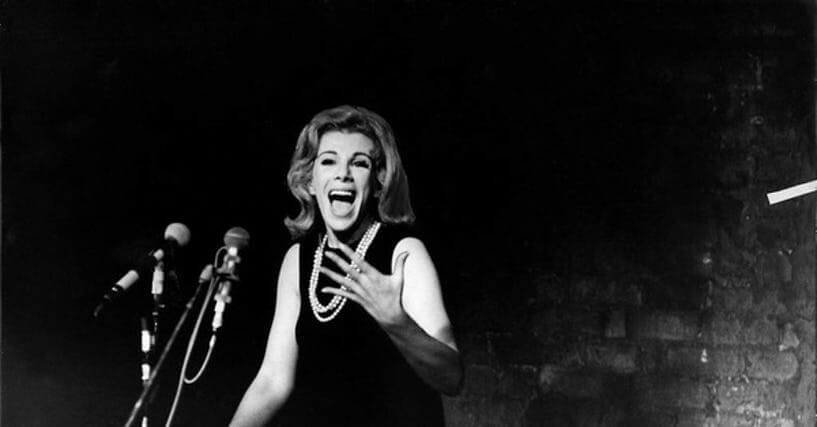How to level up from mics to shows

As a stand-up comedy newcomer, it can sometimes feel like a gargantuan task to move from open mics to booked shows. What’s more, mics can feel like a masochistic exercise of, “how much of a beating can my self-esteem take before I pull a KONY 2012 meltdown?” After swimming up stream crafting your material, shows are a sought after reward validating your hard work. There’s no linear path towards getting booked, but there are tangible steps you can take to move in that direction.
1. Be friendly and ‘find your people.’
When you’re starting out, the people who are going to book you on shows are your friends and mentors.
When you’re at open mics, don’t just do your set and skedaddle; hang around and reach out to people. If you like someone’s joke, tell them. If you think someone is funny and/or enjoy being around them, make an effort to see that comic outside of mics.
Many comedy shows are like hangs and everybody wants to spend time with those they love most. Be someone people want to be around. It sounds political, which sometimes it is, but if you make a genuine effort to surround yourself with comedians/comedy you like and treat everyone with kindness and respect, the give and take is all sincere.
“I think the only thing you shouldn’t do is try to create your comedy in a vacuum. If you try to work alone, or be above it all – and you don’t meet or connect with people, I think a lot of people get lost there. You have to find your people. These are the people you’re going to be with for years, it’s like your graduating class, and there’s a bond and a closeness there with the people you did mics with that, for me, has been one of the most rewarding aspects of comedy. Seeing people grow and growing closer with people over the years.” – Marcia Belsky
2. Have your own show.
DIY, baby! If you do the work to properly promote it, producing your own show is an excellent way to ensure yourself stage time. What’s more, producing your own show can be used as a credit to promote yourself. Plus, you can use it as leverage for spots on another comedian’s show.
3. Support your friends’ shows.
It’s all about that quid pro quo. The first time I went to a more established friend’s show, I was given a guest spot. I didn’t realize this was common practice amongst comedians, but if you hang around and support your buddies, they’ll sometimes give you that sweet, sweet stage time.
4. Bark.
If you are an introverted sweet pea who’s exhausted by the idea of all of this “friend-making,” barking may be for you! You don’t need to engage with anyone beyond shouting, “Comedy show inside! Five dollar beers! AC! Please love me!”
When you’re starting, barking is one of the easier paths to stage time in front of a room of non-comedians. It can be an unpleasant experience, but worth it if it’s getting you on a quality show.
5. Bringers.
Do you have rich alcoholic pals that want nothing more than to see YOU tell jokes? Wow, you do? Please, hook me up because your girl is trying to get on a bringer.
As with barking, there’s a stigma attached to Bringers. Mostly because comics are salty about not having several friends who can shell out $40 dollars to see their comedy, but ALSO because some of them are unethical. The booker may not care about the quality of the showcase so it becomes an exploitation newcomers for money. What’s more, many beginners get stuck doing bringers. They’ll go to an open mic, bomb, and run back to the comfort of an easy laugh (because you’re performing for family and friends), never learning how to properly write a joke.
Nevertheless, if you do your homework, some of them are a doorway into clubs. Plus, If you have a 5-7 minute set you’d really like to record, bringers are a great place to acquire a high quality tape.
6. Make art.
Are you an ARTEEST? Does Michaelangelo swoon 4 u? Did you attend art school, but when you entered the workforce you were like, “nah,” and have yet to use your degree in any meaningful way? Then poster-making is for you.
Comedians all want a super fly poster for their comedy show. However, we’re all poor lil’ babies working with pennies. Notice a show doesn’t have a poster (or if they have one, it’s trash)? Offer up your poster making services for free in exchange for a spot. They get a dope flyer and you get an opportunity to show off your sillies. Everybody wins!
7. Get credits.
How do you acquire a credit when you’re struggling to get on bar shows? Get creative!
“There are always other avenues to get credits,” says Brandon Scott Wolf. “I was an SNL Weekend Update freelance contributor before moving to New York. Develop a social media presence that’s undeniable, write for a comedy publication like The Onion or Clickhole, or figure out a way to go viral. It’s all about standing out!”
Also, if you have a video you like of your stand-up (or any type of comedy), submit to comedy festivals. Festivals are a great way for newcomers to be seen, legitimized and receive a credit.
8. Ask.
Heck yeah, it’s uncomfortable! But if you send an unassuming message to the producer of a show along with a video, no one will fault you. Your messages will most certainly be ignored, but some of them won’t. Asking for spots is how a lot of comedians get booked. The person who’s booking a show is more likely giving a spot to a friend who has asked, as opposed to someone who has not.
Owner of the world-famous Comedy Cellar in New York, Noam Dworman, told GOLD this exact same thing during a recording of The Comedy Cellar Radio Show.
9. Put in time and be funny.
If you’re not getting booked, there maaaaay be a valid reason why. Maybe you’re just not quiiiiiiite ready. Keep writing, keep going to mics, and reach out to other comedians. As long as you’re funny and not a creepy or mean magoo, it’ll eventually happen.
10. There’s no “one size fits all” path.
There are no right or wrong way to do comedy.
“I used to always stress about whether or not I was doing enough mics. I’d do two-three a night, four-five times a week and worry it wasn’t enough until a comic I loved told me she would just do one mic, every other night or so, and only do a second set if she felt she really wanted to try something specific again,” Marcia Belsky says. “Otherwise, she’d go home and write. It made me realize that for some comics, you can get distracted by doing so many mics that it almost becomes counterproductive. So, what works for one person might not work for you.”
Know thyself and push forward accordingly.
BLAIR DAWSON (intern, workshops) is a standup comic and improvisor who produces and co-hosts a monthly storytelling and stand-up show sponsored by Babeland called “U Up?” @UrGirlBlair
